Key takeaways:
- Pro-life advocacy emphasizes supporting life at all stages, advocating for women’s empowerment and providing resources to choose life.
- Peer discussions enhance understanding and empathy, revealing diverse perspectives that challenge assumptions and foster personal growth.
- Storytelling and compassionate language are crucial in advocacy, helping to connect with others and make emotional impacts rather than relying solely on data.
- Engaging with differing viewpoints promotes dialogue and common ground, encouraging a deeper understanding of motivations and fears within the pro-life discussion.
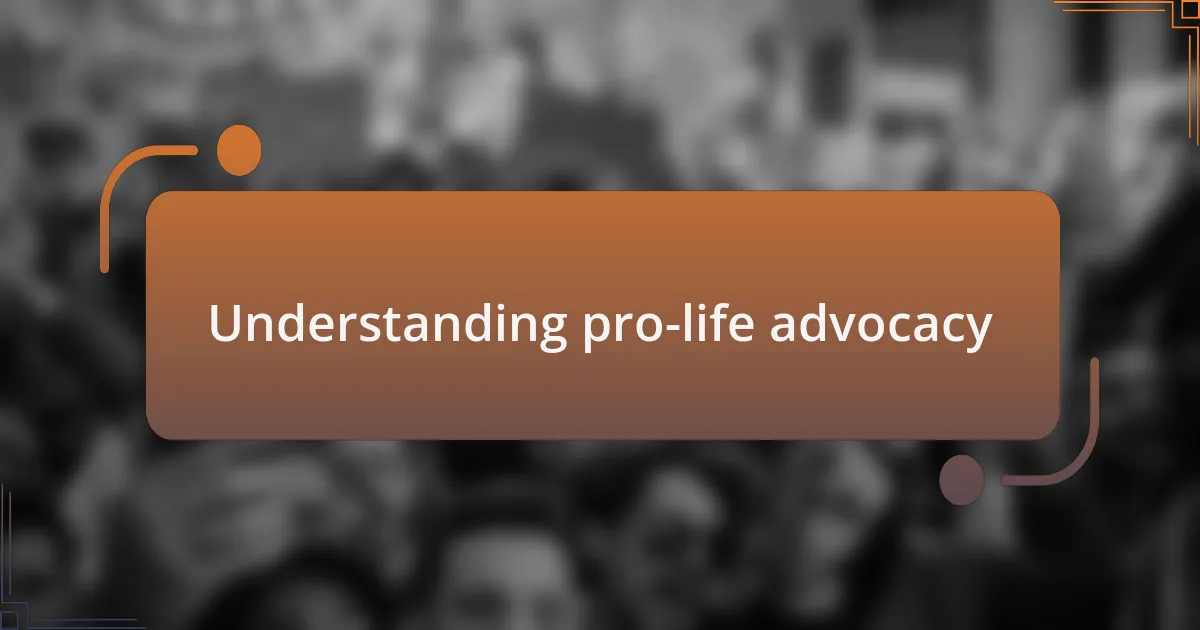
Understanding pro-life advocacy
Pro-life advocacy is deeply rooted in the belief that every human life has inherent value from the moment of conception. I remember attending a community workshop where a speaker shared her own experience of carrying a child with a life-threatening condition. Hearing her story made me reflect on the complexities and emotional weight of choices surrounding life and death—questions that many grapple with, often without clear answers.
At its core, pro-life advocacy is not just about opposing abortion; it’s about fostering a culture that supports life in all its forms. I’ve had discussions with peers who emphasize the importance of providing resources for mothers, which can transform the narrative from one of fear to one of hope. How do we ensure that women feel empowered to choose life? This is a question that resonates with many in the movement and drives our shared commitment to creating supportive environments.
Importantly, understanding pro-life advocacy means recognizing the diverse perspectives within the movement. During a recent conversation with a pro-life friend, I learned about the intersection of various social issues, like healthcare and poverty, that influence the pro-life stance. This dialogue highlighted how compassion and empathy play crucial roles in advocating for life—not just in the womb, but extending through the entirety of human experience.
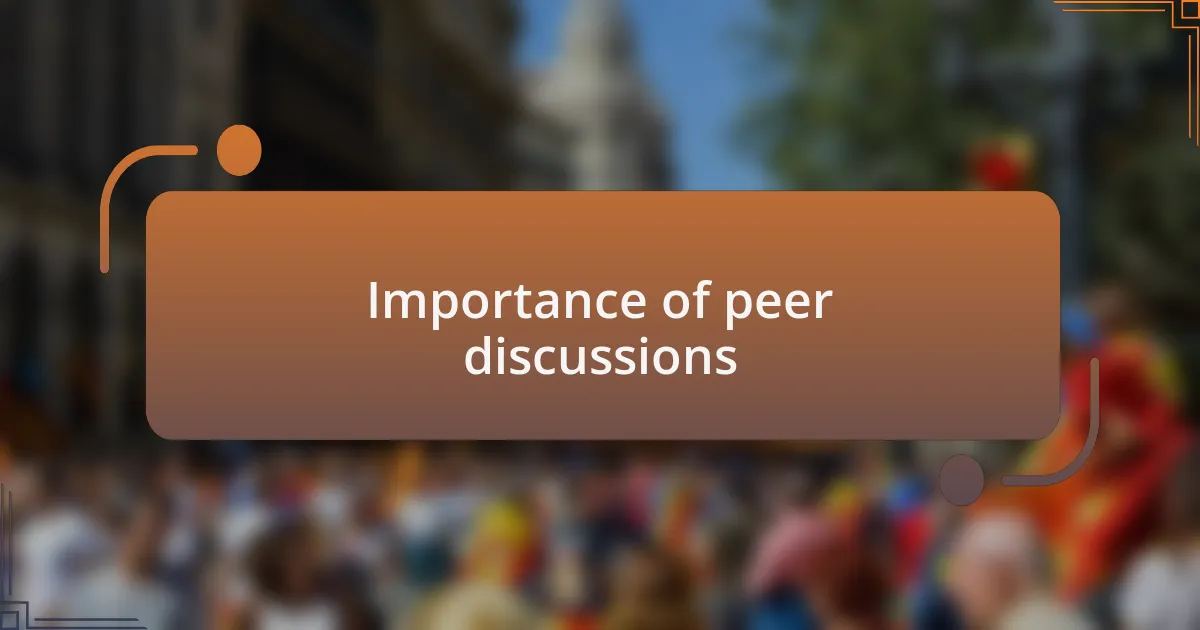
Importance of peer discussions
Engaging in peer discussions is vital to developing a richer perspective on pro-life advocacy. I recall a time when I was part of a small group discussion that delved into the ethical and emotional implications of adoption versus abortion. Listening to the diverse viewpoints helped me appreciate the complex emotions involved and reinforced my belief that every conversation has the potential to shift our understanding in profound ways.
The classroom isn’t the only place for learning; sharing experiences with peers can significantly shape our advocacy efforts. I remember a heartfelt exchange with a fellow advocate who had survived an unplanned pregnancy; her insights about the fear and bravery of choosing to keep her child left a lasting impression on me. It made me realize how storytelling serves as a powerful tool in breaking down barriers and fostering empathy toward others’ situations.
Peer discussions also encourage critical thinking and challenge our assumptions. During a recent debate with friends who hold different stances on reproductive rights, I found myself grappling with hard questions that confronted my initial beliefs. This process of questioning not only strengthened my resolve but also deepened my understanding of why we communicate our pro-life values the way we do—it’s about connecting with others authentically and compassionately.
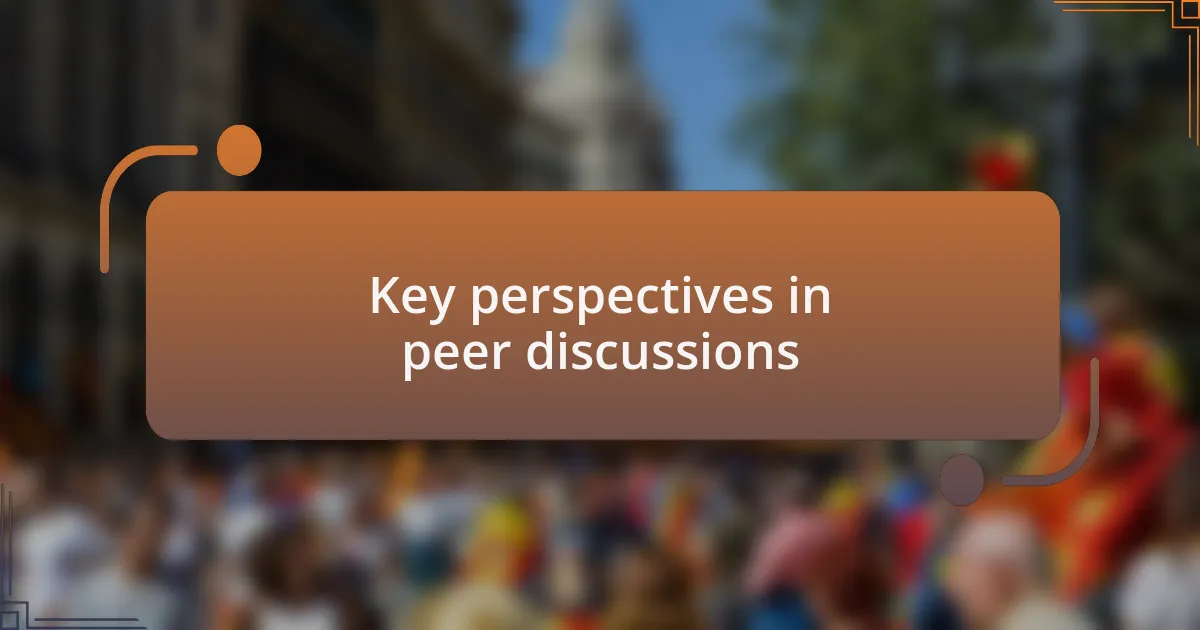
Key perspectives in peer discussions
In peer discussions, I’ve often encountered perspectives that challenge my assumptions. For example, during an informal gathering, I met someone who had once been staunchly pro-choice. Hearing her articulate her journey towards pro-life advocacy opened my eyes to the personal transformations that can occur through dialogue. How often do we pause to listen to the stories that shape our peers’ beliefs? It’s a reminder that our conversations can foster not just understanding, but also growth.
A poignant moment came when a colleague shared her experience with a close friend facing an unplanned pregnancy. She spoke about the internal conflicts and support networks that emerged, which made me reflect on the broader societal implications of these individual stories. I realized that understanding the nuanced emotions—fear, hope, and resilience—behind someone’s decision can significantly enhance our advocacy. Did this moment remind me that compassion can sometimes speak louder than rhetoric? Absolutely.
The richness of peer discussions often lies in the unexpected insights we find. I remember participating in a workshop where we explored the intersection of faith and pro-life advocacy. Some participants articulated their beliefs in a way that challenged my own views, making me confront why I believe what I do. This dynamic not only encouraged me to reassess my approach, but it also helped me appreciate the diverse motivations that drive people’s advocacy. Isn’t it fascinating how differing perspectives can lead to a deeper understanding of our shared mission?
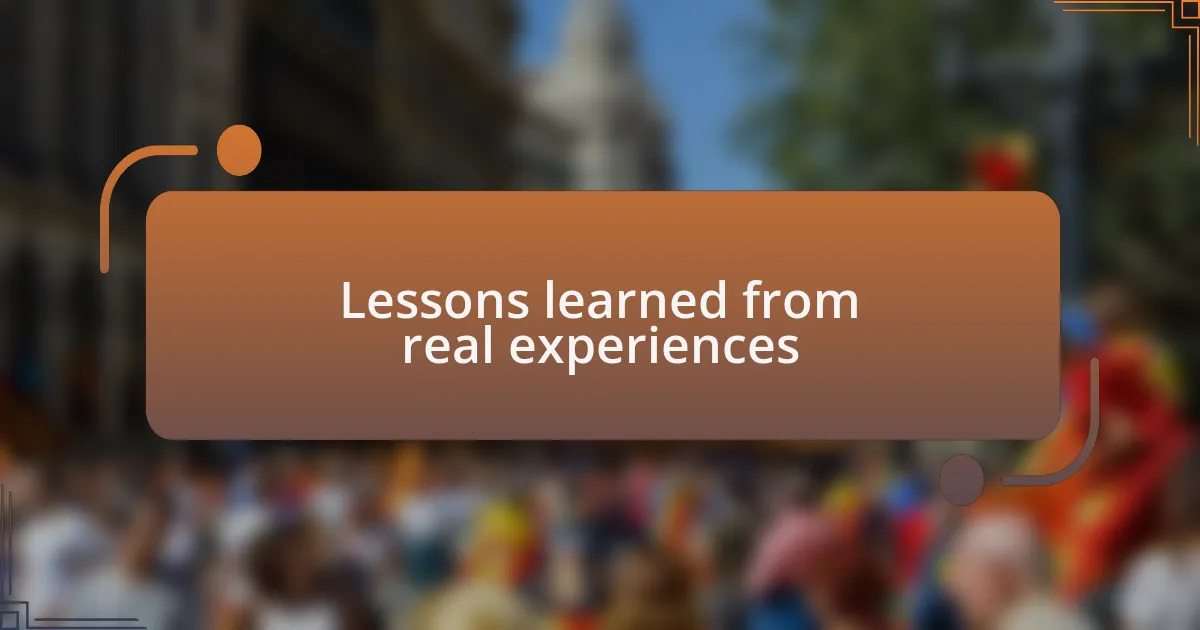
Lessons learned from real experiences
I remember a particularly eye-opening discussion with a fellow advocate who shared her experience of standing outside clinics. Her stories about the complex emotions she encountered—from anger to empathy—made me realize how advocacy isn’t just about presenting facts; it’s about connecting with people on a human level. When was the last time we considered the emotional weight behind our actions?
During another conversation, a friend recounted her personal battle with infertility and how it transformed her perspective on pro-life issues. I had never fully grasped the heart-wrenching dilemmas that couples face when they long for a child. It struck me that all experiences—whether positive or painful—shape our views on life, and understanding these narratives can deepen our advocacy efforts.
One day, while discussing the potential fallout of restrictive abortion laws, a peer shared his fear for a friend’s safety who had faced abusive situations. His insight resonated with me, prompting me to think about the real-life consequences of our policies. How can we advocate effectively if we overlook the fears and realities that many endure? This exchange taught me that true advocacy requires listening deeply and valuing the stories that often remain unspoken.
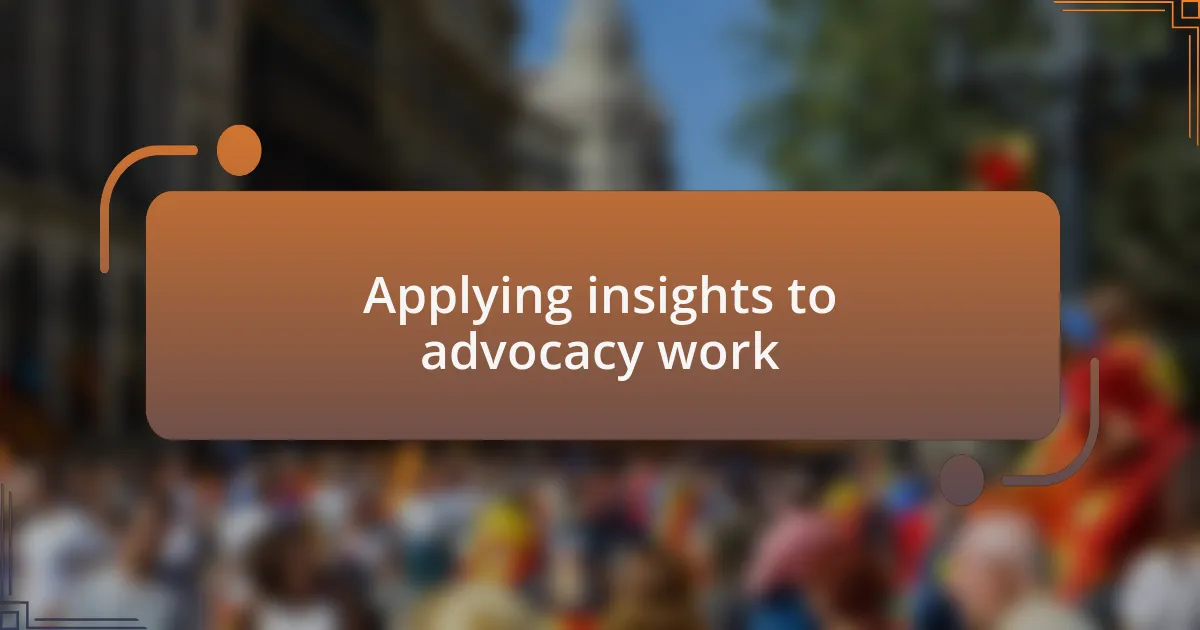
Applying insights to advocacy work
One of the most profound shifts in my advocacy work came from a conversation with a mentor who emphasized the importance of framing our language. When we discussed strategies for presenting our views, she pointed out that using compassionate language can bridge gaps between differing perspectives. Have you ever noticed how a simple word choice can change the tone of an entire conversation? This taught me to approach discussions with a mindset focused on connection rather than confrontation.
As I reflected on another peer discussion, I realized how crucial it is to share stories of hope alongside the challenges we face. A friend recounted a success story in her advocacy, where a community rallied around a vulnerable woman, offering support and resources that changed her life. Hearing about this gave me a renewed sense of purpose. It reminded me that showcasing positive outcomes can inspire others to join the movement. Are we doing enough to highlight these instances of compassion and community action?
Moreover, a recent group discussion about intersectionality opened my eyes to the diverse experiences within the pro-life movement. It became clear that a one-size-fits-all approach is ineffective. Each person’s background shapes their understanding of reproductive issues, and acknowledging these nuances can enhance our advocacy. When was the last time you considered how different stories could enrich your approach? I’ve started to actively seek out diverse perspectives, knowing that they will enhance not only my advocacy but also foster deeper connections among varying communities.
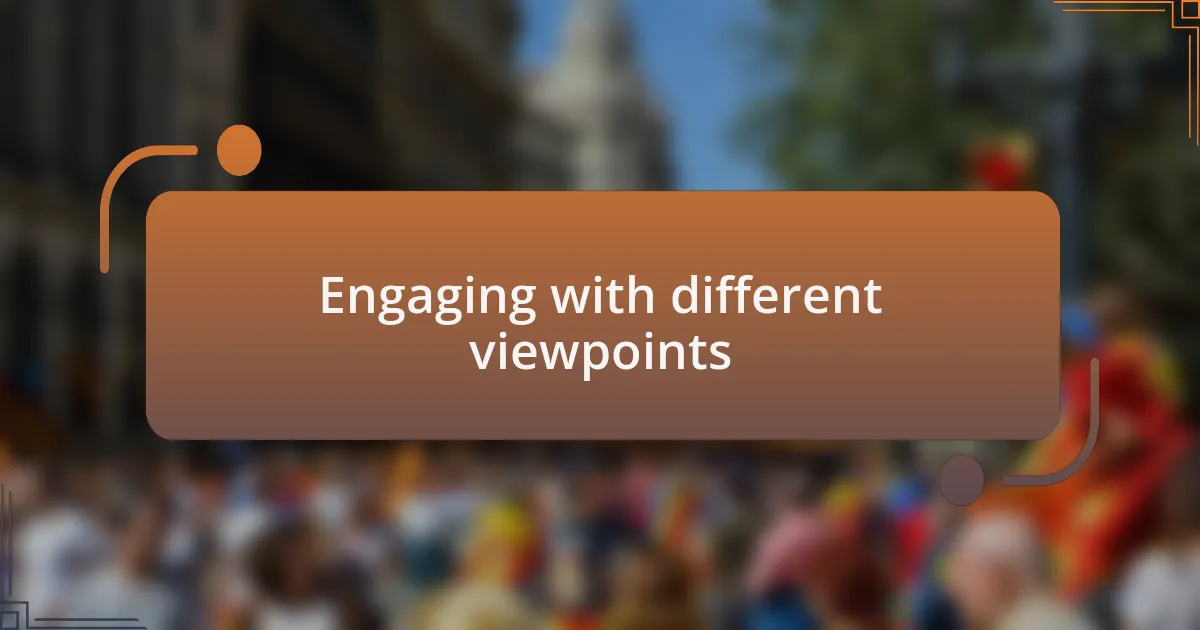
Engaging with different viewpoints
Engaging with different viewpoints is essential for a well-rounded understanding of pro-life advocacy. In one of my discussions, a peer shared their perspective on the impact of social media on this discourse. They mentioned how online platforms can polarize perspectives, making it challenging to find common ground. I found myself reflecting on my own engagements online—have I been too quick to dismiss opposing views? This realization pushed me to approach conversations with a more open heart.
During a recent forum, a participant spoke about their personal journey with unplanned pregnancy and the support they received from unexpected allies. Listening to their story was a powerful reminder of how multifaceted our experiences can be. I started to recognize the strength in vulnerability—sharing our narratives can foster empathy. Wouldn’t it be wonderful if we all took a moment to hear and understand those stories instead of jumping to conclusions?
I’ve also had the chance to engage with someone who held staunchly different beliefs about reproductive rights. Initially, I felt defensive, but as we talked, I realized that understanding their motivations and fears allowed me to find common values. This experience taught me that engaging with different viewpoints doesn’t mean compromising my stance; it signifies a commitment to dialogue. How often do we shy away from these conversations because of fear? I believe we should embrace the discomfort.
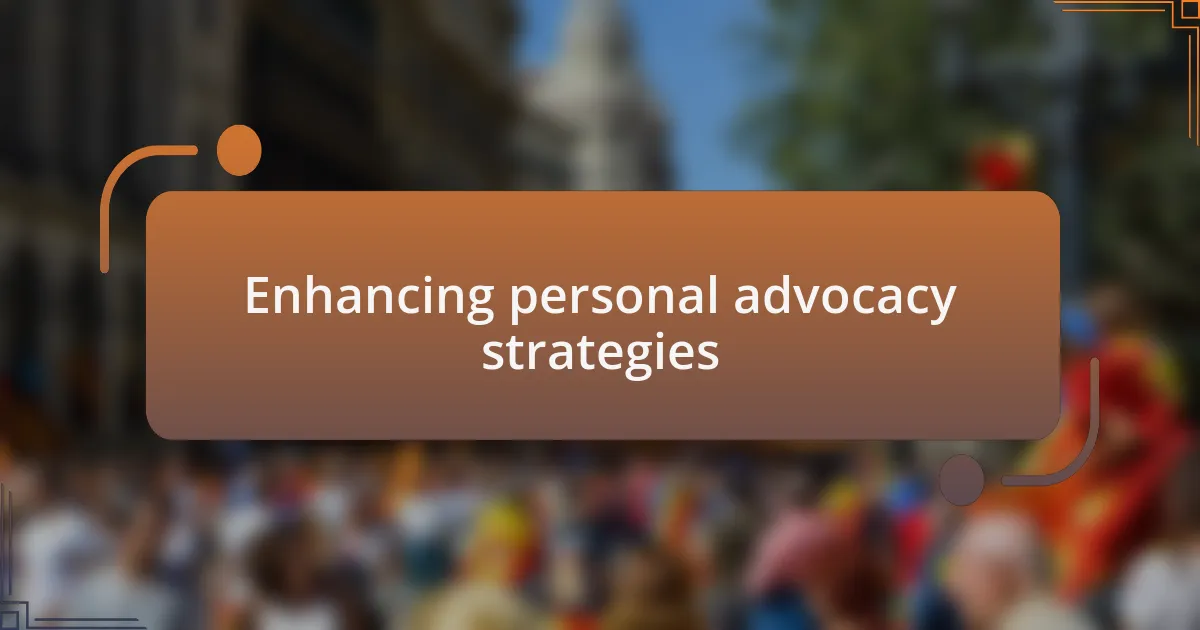
Enhancing personal advocacy strategies
Enhancing my personal advocacy strategies has been a transformative journey. I once attended a workshop where a seasoned advocate emphasized the importance of storytelling in our efforts. Hearing her passionately recount the experiences of individuals affected by abortion laws made me realize that sharing personal narratives isn’t just impactful—it’s vital. Have I been using my own stories to connect with others effectively? This pushed me to reflect on my own journey and figure out how I can integrate my experiences into my advocacy.
In another conversation, I explored how concrete examples can make abstract concepts more relatable. A peer mentioned how data alone often fails to create emotional connections. I remember discussing a case where a woman’s choice profoundly affected her family, and that moment shifted my perception. Instead of solely relying on statistics, I started to incorporate human elements into my discussions. It’s been eye-opening; using personal stories makes arguments resonate on a deeper level. Have you ever tried weaving a narrative into your advocacy? It might just change the dynamic.
Lastly, I learned that questioning and listening are powerful advocacy tools. During a discussion with a fellow advocate, I was reminded of a time when I jumped to conclusions without fully understanding the other person’s stance. We decided to practice deeper questioning techniques, like asking, “What led you to that belief?” This simple shift in approach not only enriched our dialogue but also encouraged openness. How might your advocacy change if you prioritized listening over responding? I know for me, it has fostered richer connections and broadened my understanding, making my advocacy strategies all the more effective.